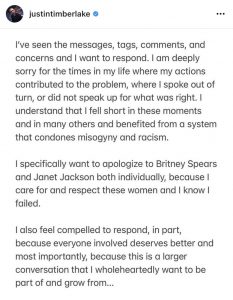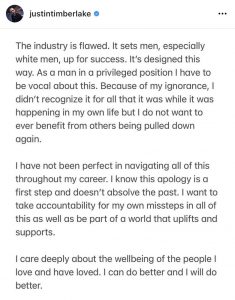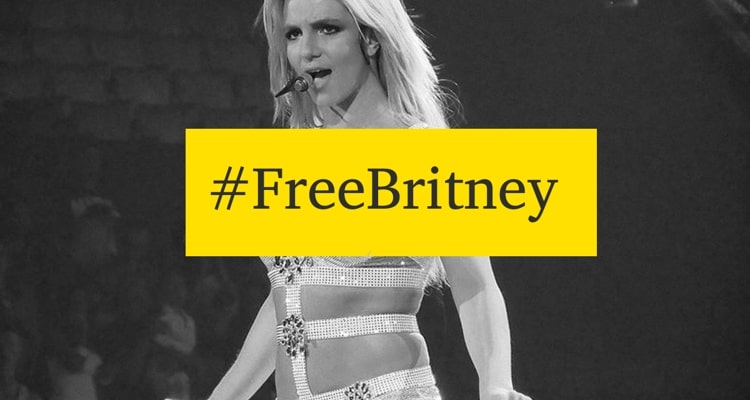By Charlotte Jude
After watching The New York Times’ documentary ‘Framing Britney’ that aired on Sky last week, I was confronted with a shocking reality that changed my perspective on celebrity culture forever. The motivation behind the documentary, which had become so popular in the US that it was quickly streamlined onto UK television, was to expose the reasons behind her 12-year long conservatorship agreement and the #freebritney movement. But as it dug a little deeper, what it really exposed is much more sinister.
Now we are all familiar with the Entertainment industry, with most of us aware of how it is plagued with misogyny, abuse, and general toxicity. There are countless stories of celebrities who have struggled over the years, with people speaking up about sexual abuse they have experienced, how they’ve been relentlessly bullied and criticised and the tolls that this has taken on their mental wellbeing. Despite having a long list of stars who did not make it through these dark times, the culture remains unchanged. What this documentary was able to highlight so vividly is how, as a society, we managed to destroy a young, confident, and talented female singer who suffered so unnecessarily at the hands of the press, the exploitative men in her life and the world.
Flashback to the start of Britney’s career and you will see a small-town ‘girl next door’ with a core talent and aptitude for singing. Her natural and confident stage presence transferred from her performances to fan interactions and in interviews. Britney was a phenomenon. Amassing over 100 million record sales worldwide and winning 32 awards across her career, her success is undeniable, whether you’re a fan of ‘Baby One More Time’ or not. Something in particular that stood out to me throughout this documentary was the way Britney handled casual sexism that came to her in the form of questions and comments. With the world fixating on her breasts, her virginity status and the way she moved in her famous music videos, even the most determined young woman begins to struggle in the face of such rampant misogyny. While she never failed to call the interviewers out on their offences, questioning why the men in the industry aren’t subject to the same sort of scrutiny, Britney became more reserved in her interactions with the world, hoping to protect herself and sexuality since she was just 16 when these questions began arising.
Between the years 1999 and 2002, America’s dream celebrity couple took centre stage. By dating Justin Timberlake, Britney gave the world exactly what they wanted, a couple that critics likened to the American alternative to royalty. So, when it all fell apart, the world unsurprisingly wanted to know why and how. While Britney remained relatively guarded about what happened, Justin infamously took the opportunity to monetise their break-up and give details about their sex life and the situation. In an array of interviews, Timberlake joked about how he had sex with the star, victoriously declaring ‘okay, yeah I did it’ which was met with a round of applause. He engaged in numerous attempts to cash in on their breakup, treating Britney like a trophy and a commodity, despite her desires to keep her virginity and sex life private. The song ‘Cry Me A River’ is especially poignant, including a Britney look-alike to retell the story of their breakup. In an interview with Prime Time in 2004, Britney opened up about the situation and began to get emotional when she explained that she didn’t think Justin would ‘exploit’ her as much as he did. While trying to shrug it off to maintain some dignity in the situation, it is clear to see that Britney was affected by Justin’s treatment. In the February of this year, Timberlake released a public statement, apologising for his engagement in the patriarchal activities of the music industry and his treatment of both Britney and Janet Jackson, an apology that you can read here:


Images found @justintimerlake https://www.instagram.com/justintimberlake/
Now when we think of Britney, what comes to mind for most is her public breakdowns in the mid-late 2000s following her divorce and the retraction of custodial and visitation rights of her children. Images of her with an umbrella attacking paparazzi, shaving her head and stumbling out of nightclubs are forever burned into our minds. But as a society, what did we do when these problems started to arise? We simply sat back and watched her struggle. While the terms ‘mental health’ and ‘mental illness’ were seldom used at the start of the new millennium, it is clear to see that we simply viewed Britney as a showgirl, a piece of entertainment, and not a person. While the tabloids reported Britney as being ‘crazy’, ‘psycho’ and ‘troubled’, taking photos that cashed in for up to a million at the time and hooked readers in with tone death headlines such as ‘amazing photos inside’, it is clear to see why Britney snapped. Having been hounded by celebrity videographers for years, particularly at personal moments such as the infamous situation wherein her ex refused to let her into her house to see her children, Britney was subject to horrendous exploitative treatment by the press, who in the documentary, failed to address their part in her ‘downfall’, even going on to rationalise their behaviour. This situation is not one that we have seen before and it is something we continue to see. The publication of celebrity ‘meltdowns’ is far too common and generate insurmountable amounts of money. So why did this happen to Britney and why wasn’t it stopped? There was simply too much money to be made from her suffering…
Now seems a perfectly apt time to introduce Jamie Spears, Britney’s father who had not played much of a role in her life until the speak of her struggles’ in 2009. Having had trips to rehab, issues with substance abuse and reports of suffering from bipolar and anxiety disorders, Spears was in her most vulnerable state. Considering all of this, Jamie, a figure who is known by those close to Britney as being money-oriented (having said in an interview during Britney’s early success that she can now finally buy him a boat while her mum bashed about her pride as one example), sought after a conservatorship over her person and estate. Now the definition of a conservator is ‘one that preserves from injury or violation’, and so a conservatorship agreement essentially allocates a specific protector to make decisions for a person who is too vulnerable or at-risk to make decisions for themselves. Bearing in mind that this legal agreement usually only involves elderly persons, the scenario rose suspicions in fans from the get-go. Almost 12 years later, that conservatorship is still firmly intact, with her father having control of her finances, access to her medical records and being able to control where Britney goes and who she sees. It is not an under-exaggeration to say that this is essentially a form of modern slavery and exploitation. The conservatorship has been described as a ‘hybrid business model’ by legal officials and questions were raised whether, if in the same situation, this would have happened to a man. Despite being granted permission to add her bank as co-conservator in 2020, Britney still refuses to work until her father steps down, having declared that she is scared of her father and does not want him in control of her decisions.
These disturbing and upsetting situations represented in the documentary only breach the surface of the problems within the entertainment industry. The extent of abuse Britney has received throughout her life is simply shocking, and I can confidently say that we are all guilty in some way of engaging in this culture. I for one feel ashamed to admit that before researching this topic, I had associated Britney as ‘crazy’ and as ‘attention seeking’ at some point in my life, passing off her struggles as normal for celebrities and thinking that she’s just another cog in the machine. But that’s the frightening point. By overlooking the struggles celebrities face, by consuming the tabloid content which associates struggling people as ‘crazy’, by stereotyping, remaining uneducated and by putting these people down, we are only going to add to the list of people who we only seem to care about when they’re gone. How many documentaries, deaths, rehab visits and ‘be kind’ hashtags is it going to take before people actually start listening? While it is frankly disturbing to see how little the industry has progressed in terms of the way we treat celebrities, by educating ourselves on stories such as this, we can become more aware and ignite real change, so that we no longer have to learn the hard way.
To watch the documentary, you can find it on Sky Documentaries: https://www.sky.com/watch/channel/sky-documentaries
#freebritney
Cover Image Credit: https://www.digitalmusicnews.com/2021/02/12/britney-spears-father-conservatorship/


